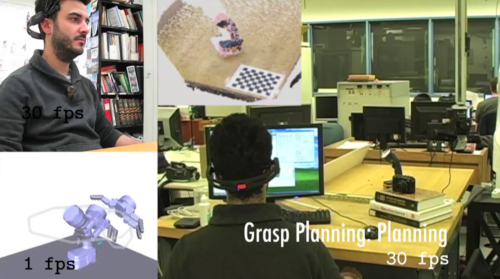Computer Science Professors Win NSF Grants
Five professors in the Department of Computer Science have recently won National Science Foundation (NSF) grants totaling nearly $4 million to further their research projects.

Professor Allen's project: Brain-Computer interface for robotic grasping. Subject (top left) uses a brain-computer interface device to move a robotic hand in a simulation window (lower left). The simulation object is acquired and registered from the real physical object via a range scan of the object on the table (top middle). The simulator can suggest sample stable grasps, and the subject can then send this grasp to the physical robot grasping system (top and bottom right) to grasp the object.
Professor Peter Allen won a pair of grants, including a $1.2 million award over five years for his project, “Assistive Robotics for Grasping and Manipulation Using Novel Brain Computer Interfaces.”
Allen is the principal investigator on the project, which includes co-principal investigators Joel Stein, Simon Baruch Professor and Chair of the Department of Rehabilitation and Regenerative Medicine in Columbia’s College of Physicians and Surgeons, and Sanjay Joshi, an associate professor in the Department of Mechanical & Aerospace Engineering at the University of California, Davis.
The collaborative project brings together a trio of researchers from the fields of signal processing (Joshi), rehabilitative medicine (Stein), and robotic grasping (Allen), to create an assistive robotic system that will allow severely disabled patients to control a robot arm/hand system to perform complex grasping and manipulation tasks using novel brain muscle computer interfaces.
With Associate Professor Eitan Grinspun, Allen has also won a $499,000, three-year grant for their joint project titled, “Dexterous Manipulation Using Predictive Thin-Shell Modeling.”

Efficient clothing simulation: Professor Grinspun developed a fast manifold projection algorithm for integrating constrained equations of motion, and applied this algorithm to the modeling of inextensible (non-stretchy) fabric. Using constraints in place of elastic forces, they can compute the motion of worn garments such as silk and denim in less time and with increased fidelity.
They will use offline simulation to predict states of deformable objects modeled as thin-shells (i.e. cloth, fabric, clothing) that can then be recognized by a robotic vision/grasping system to pick up and manipulate these objects. This project includes a significant step forward in the synthesis of state-of-the-art numerical computation of plasto-elastica with a database-driven manipulation approach to allow robots to manipulate deformable objects.
Associate Professor Jason Nieh won a pair of four-year grants, including a $783,000 single investigator NSF grant for “A Virtual Smartphone and Tablet System Architecture.” The research will develop novel virtualization technologies for running multiple virtual phones or tablets on the same physical smartphone or tablet device. Users, who today are forced to carry separate work and personal phones, can instead use the technology to only carry one phone that has work and personal virtual phones that are securely isolated from one another (watch a video demonstration here). A key feature of the technologies is that they are lightweight and fast. For example, each virtual phone can run any of the applications from Google Play, including 3D graphics-intensive games, with no visible performance difference from native hardware. Nieh’s paper on one aspect of the smartphone research won the prestigious Best Paper Award at the most recent Association for Computing Machinery Symposium on Operating Systems Principles. The symposium is the world’s premier forum for researchers on the latest advances in software systems technology.
With Assistant Professor Junfeng Yang, Nieh has also won an $800,000, four-year NSF grant for “RacePro: Automatically Detecting API Races in Deployed Systems.” Their research investigates the detection of application programming interface (API) races, which occur when multiple threads or processes access a shared resource via an API race without proper synchronization. This research studies and automatically detects for the first time an important class of races that has a significant impact on software reliability, which increasingly affects everyone, whether or not they use computers. Technologies developed will help application developers detect insidious software defects, enabling more robust, reliable, and secure software infrastructure.
Professor Kenneth Ross won a $499,996, three-year NSF grant to study improving database processing using graphics processors. Such processors offer more parallelism and higher memory bandwidth than more common central processing units (CPUs). This project aims to take advantage of these properties by developing a system to efficiently process database queries, which would have wide-ranging impact on the efficiency of many enterprises that employ database systems for analytics.
